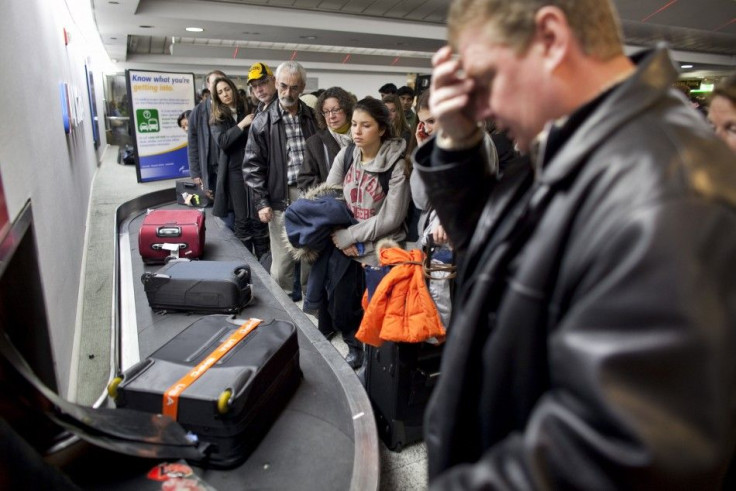US Airlines Bag $3.5B In Luggage Fees As Revenue Model Shifts

A report out Tuesday from the U.S. Bureau of Transportation Statistics makes one thing abundantly clear: The way airlines earn money these days is completely different than it was just five years ago.
The BTS figures show that U.S. airlines really are taking you for a ride when it comes to ancillary fees, the so-called “extras” that can make base fares look a lot larger when all is said and done.
The nation’s 15 largest carriers collected a combined $3.5 billion in bag fees in 2012, up 3.8 percent from 2011, according to the report. The carriers also tallied $2.6 billion in reservation change fees, up 7.3 percent from the previous year.
Not too long ago (2008, to be exact) free luggage was the norm industry-wide. As the price of jet fuel skyrocketed, however, airlines began to brainstorm ways to cover the costs. Passengers have shown reluctance to book tickets if the base fare is too high, so the carriers introduced new fees for things that were once bundled into the total ticket price.
“The ancillary revenue revolution is focusing less on product development and more on retail methods,” Jay Sorensen of IdeaWorksCompany explained in a recent study on ancillary revenue. “The big categories, such as checked bags, comfort- and convenience-adding features, and the sale of loyalty miles or points, are slowly being checked off the list by revenue-savvy carriers. Now the same airlines are enhancing the sale and promotion of a la carte services at their websites and through global distribution systems and travel agencies. The effort is paying off with 20 to 22 percent revenue increases attributed to better methods.”
Indeed, fueled by ancillary revenue, the nation’s 10 largest airlines posted a combined net profit of $201 million last year, compared with a net loss of $500,000 in 2011.
Ancillary revenue was once largely limited to low-fare airlines, but is now the lifeblood of many large carriers worldwide -- and big companies, according to the researchers, generate the biggest results.
In baggage fees alone, Delta Air Lines earned $866 million dollars last year, followed by United Airlines ($706 million), American Airlines ($557 million) and US Airways ($516 million).
Based on percentage of total revenue, budget carrier Spirit Airlines led the pack, thanks to sky-high checked luggage prices that rose last year to $100 for select passengers. The “low-cost” carrier ranked No. 5 in baggage fees, despite not being among the top 10 carriers in the U.S. by passenger numbers.
Most airlines charge travelers a fee of around $25 for the first checked bag and $35 or more for the second. Exceptions to the trend include JetBlue, which doesn’t charge for the first bag, and Southwest, which allows two free checked bags.
According to the BTS report, reservation change fees have grown nearly as high as the baggage ones.
Delta Air Lines once again topped the list, pocketing $778 million dollars in 2012. United Airlines ($661 million) and American Airlines ($518 million) also turned a big profit on reservation change fees in 2012.
The figures for 2013 will likely be much higher. In recent weeks, most airlines have hiked fees from about $150 to $200 for domestic tickets, while changes to international flights cost around $300.
Reservation changes and baggage are the only ancillary fees airlines report to the BTS as separate items. Others such as revenue from on-board food and beverage sales, seating assignments and entertainment options are not identified individually.
Yet these fees are just the tip of the iceberg. KLM now charges 12 to 15 euros on select flights for preordered meal upgrades. Qantas sells RFID-equipped bag tags that allow passengers to bypass lines at the ticket counter. Vueling will hold the middle seat empty, board you early and provide a drink and snack for around $73. Air Asia will even give you Red Carpet Service with elite-style perks for about $25.
Analysts say these products, which you can expect to pop up in the U.S. market, highlight an evolution that is occurring in how travel is sold to consumers -- an evolution fueled by creative add-ons.
© Copyright IBTimes 2024. All rights reserved.






















